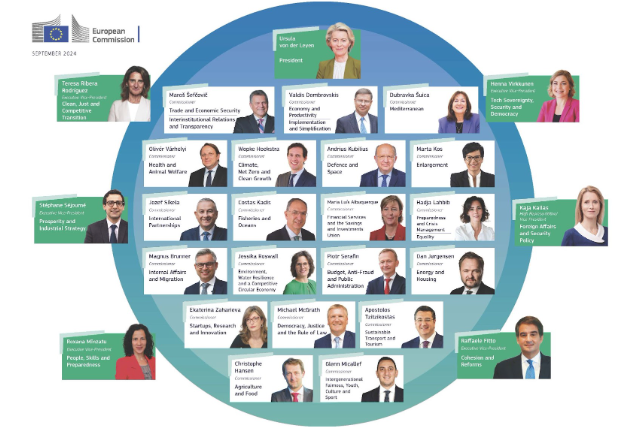The New European Commission - Who is who and what is what?
By Anna-Magdalena Glockzin, 3 minutes.
Finding a team that works well together and is fit for the job is always a big challenge. But if one has to take into account preferences of third parties and the political messages attached to the team’s selection, it gets even messier. However, this is the task that European Commission President (of the current as well as the new Commission) Ursula von der Leyen had to manage when nominating her new team of Commissioners. But let’s start from the beginning.
The European Commission is the executive body of the European Union (EU) and has a mandate for five years. Its role is to steer the EU’s direction in terms of policies and laws, oversee their implementation (in the member states), and to handle the budget, for instance, by allocating funding. In July 2024, Ursula von der Leyen got elected as the Commission President for the 2024-2029 Commission by the European Parliament (as she did in July 2019), after presenting her plans and priorities for the New Commission to the Members of the European Parliament (MEPs). Subsequently, she had to write 26 letters to her selected respective Commissioners, in which she emphasises their role, their tasks and the broader goal of the Commission, laying out a “job description” for the Commissioner candidates. The choice, however, is not totally up to Von der Leyen. All 27 Commissioners have to represent the 27 member states, which means every EU country sends one Commissioner. The member states can make suggestions for their Commissioners-designate, which is then the basis for the President’s decision. For the new Commission, Von der Leyen laid emphasis on a more gender-equal approach, causing some disputes with certain countries. For example, Slovenia proposed initially former top auditor Tomaž Vesel, but after Von der Leyen increased pressure to switch the male candidate to a female, Vesel dropped out of the process and Slovenia appointed the former ambassador and former vice president Marta Kos. In the final lineup, 11 out of the 27 Commissioners are women, making up 40%, which was an increase of 18% compared to the first set of nominations.
An important aspect of further understanding what the New Commission is about lies in its political goals and the vision for the next five years. The core priorities are prosperity, security and democracy, with the background being competitiveness of the Union. More concretely, the President outlined in her Political Guidelines for the Next European Commission 2024-2029 her plan for Europe’s sustainable prosperity and competitiveness (keyword: Clean Industrial Deal), investing and improving European defence, increasing social fairness and ensuring economic support for those in need, protecting the EU’s values like democracy and the rule of law, and leveraging its power and partnerships. Especially, the focus on competitiveness, security and geopolitical power is mirrored in the assigned portfolios of the Commissioners-designate, which can be seen in the short introductions of the candidates at the end of the article. Furthermore, the selection shows which member states gained political power and who tipped over the edge. Estonia’s and Latvia’s Commissioners both have key portfolios as well as Lithuania’s and Finland's candidate, reflecting the region’s increased political weight after Russia’s full-scale invasion of Ukraine. They will work on foreign policy (Estonia: Kaja Kallas), security and democracy (Finland: Henna Virkkunen), defence and space (Lithuania: Adrius Kubilius), as well as economy and productivity (Latvia: Valdis Dombrovskis). At the same time, Hungary’s Commissioner-designate Oliver Várhelyi was assigned the portfolio of health and animal welfare. It is speculated that Von der Leyen calculated the risk that he might not survive the European Parliament hearings due to the fact that he is a very controversial candidate (in the past, he called MEPs “idiots”), forcing Hungary’s government to propose a new (and more suitable) candidate. The follow-up of this article will cover what transpired during the Commissioner hearings, including which candidates were accepted by the European Parliament and which were rejected. So stay tuned!
